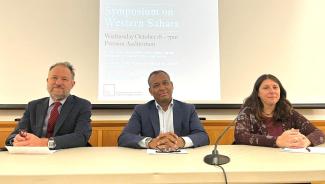
Hamilton (New York), October 19, 2023 (SPS) - The member of the National Secretariat and Representative of the Polisario Front at the United Nations and Coordinator with MINURSO, Dr. Sidi Mohamed Omar, delivered a lecture at Colgate University in the city of Hamilton, New York State, USA, within the framework of the seminar organized by the University’s Peace and Conflict Studies Program and facilitated by Professor Jacob Mundy, the expert on the Western Sahara file.
At the beginning of his lecture, the Sahrawi diplomat and academic reviewed a number of basic facts that constitute the legal and political framework for the Western Sahara issue, which has been registered as a decolonization issue at the United Nations and its relevant bodies since 1963.
Regarding the root causes of the conflict in Western Sahara, Dr. Sidi Mohamed Omar referred to the expansionist ideology of the so-called “Greater Maghreb” that the Moroccan regime adopted as a political tool to ensure its continuity, especially after two coup attempts against the head of the regime, which prompted him to look for an outlet for the crisis of legitimacy that he was suffering from during his invasion and illegal occupation of Western Sahara in October 1975.
The Representative of the Polisario Front at the United Nations and the Coordinator with MINURSO while discussing the reasons that led to the inability of the United Nations Mission for the Referendum in Western Sahara (MINURSO) to implement its mandate as defined by the Security Council in its relevant resolutions, said that the first reason lies in the Moroccan occupying state’s lack of political will to reach a peaceful and just solution to the conflict while continuing, with complete impunity, its attempts to consolidate and “legitimize” the forcefully imposed fait accompli in the occupied territories of Western Sahara.
The second reason, added Dr. Sidi Mohamed Omar, is due to the lack of will by some influential members of the Security Council to use the diplomatic and other tools that the Council possesses to force the occupying state to fulfill its obligations under the joint settlement plan between the United Nations and the Organization of African Unity, which remains the only agreement accepted by both parties, the Polisario Front and Morocco.
What increases the seriousness of the situation, stressed Dr. Sidi Mohamed Omar, is that the Security Council, due to the balance of power within the Council, has begun to follow a negative, confusing and often contradictory approach in its dealings with the UN-sponsored peace process in Western Sahara.
Therefore, it can be asserted from a legal-political perspective that the root cause of the continued decolonization in Western Sahara lies in the existing tension between the doctrine of realpolitik, on the one hand, and the legally established right of colonized peoples to self-determination and independence, on the other hand.
In conclusion, the Representative of the Polisario Front at the United Nations and the Coordinator with MINURSO stressed that the legal nature of Western Sahara as a decolonization issue is completely clear, and this means that the only way to a peaceful, just and lasting solution lies in the Sahrawi people exercising their inalienable right to self-determination and independence through a free, genuine and democratic process.
The seminar also witnessed two lectures by Professor Stephen Zunes, Professor of Politics at the University of San Francisco, California, and Ms. Adrienne Kenna, an activist for peace and human rights monitoring in Western Sahara.
The seminar was followed by an extensive and rich discussion with the audience, which addressed several issues related to the Sahrawi issue and the positions of the major countries regarding this issue, especially the United States of America.
SPS